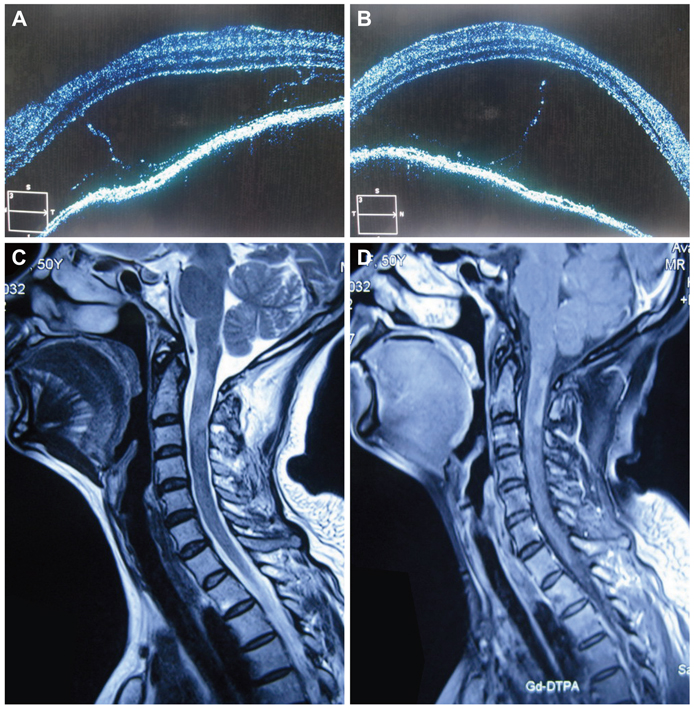J Clin Neurol.
2013 Jan;9(1):61-64. 10.3988/jcn.2013.9.1.61.
Acute Myelitis in a Patient with Vogt-Koyanagi-Harada Disease: Case Report and Review of the Literature
- Affiliations
-
- 1Department of Neurology and Center for Experimental Medicine, The Third Xiangya Hospital, Central South University, Changsha, China. hdeng008@yahoo.com
- 2Department of Anesthesiology, Tumor Hospital Xiangya School of Medicine of Central South University, Changsha, China.
- KMID: 2287573
- DOI: http://doi.org/10.3988/jcn.2013.9.1.61
Abstract
- BACKGROUND
Vogt-Koyanagi-Harada (VKH) disease is characterized by bilateral granulomatous uveitis with neurologic, auditory, and dermatologic manifestations. However, acute myelitis complicating VKH disease has rarely been reported.
CASE REPORT
A 50-year-old Chinese Han woman presented with difficulty walking, numbness on the left side of the body, and difficulty with urination. The patient was diagnosed with incomplete VKH disease and received corticosteroid treatment prior to the neurological presentation. Acute myelitis was diagnosed based on both clinical and spinal-cord MRI findings.
CONCLUSIONS
Clinicians should consider acute myelitis as a rare possible neurological manifestation in VKH disease patients, and early systemic administration of corticosteroids will suppress the acute inflammatory process and prevent recurrences. This report raises the possibility that VKH disease and acute myelitis share common pathogenic pathways.
MeSH Terms
Figure
Reference
-
1. Smith JR, Rosenbaum JT. Neurological concomitants of uveitis. Br J Ophthalmol. 2004. 88:1498–1499.
Article2. Wingerchuk DM, Lennon VA, Pittock SJ, Lucchinetti CF, Weinshenker BG. Revised diagnostic criteria for neuromyelitis optica. Neurology. 2006. 66:1485–1489.
Article3. Dahbour SS. MRI documented acute myelitis in a patient with Vogt-Koyanagi-Harada syndrome: first report. Clin Neurol Neurosurg. 2009. 111:200–202.
Article4. Tang Y, Wang X, Ding Y, Li C, Jia J. Longitudinal lesion of the spinal cord in a patient with Vogt-Koyanagi-Harada disease. J Neurol Neurosurg Psychiatry. 2010. 81:941–942.
Article5. Moorthy RS, Inomata H, Rao NA. Vogt-Koyanagi-Harada syndrome. Surv Ophthalmol. 1995. 39:265–292.
Article6. Fang W, Yang P. Vogt-koyanagi-harada syndrome. Curr Eye Res. 2008. 33:517–523.
Article7. Rajendram R, Evans M, Rao NA. Vogt-Koyanagi-Harada disease. Int Ophthalmol Clin. 2005. 45:115–134.
Article8. Damico FM, Bezerra FT, Silva GC, Gasparin F, Yamamoto JH. New insights into Vogt-Koyanagi-Harada disease. Arq Bras Oftalmol. 2009. 72:413–420.
Article9. Iqniebi A, Gaafar A, Sheereen A, Al-Suliman A, Mohamed G, Al-Hussein K, et al. HLA-DRB1 among patients with Vogt-Koyanagi-Harada disease in Saudi Arabia. Mol Vis. 2009. 15:1876–1880.10. Du L, Kijlstra A, Yang P. Immune response genes in uveitis. Ocul Immunol Inflamm. 2009. 17:249–256.
Article11. Tiercy JM, Rathinam SR, Gex-Fabry M, Baglivo E. A shared HLA-DRB1 epitope in the DR beta first domain is associated with Vogt-Koyanagi-Harada syndrome in Indian patients. Mol Vis. 2010. 16:353–358.12. Damico FM, Cunha-Neto E, Goldberg AC, Iwai LK, Marin ML, Hammer J, et al. T-cell recognition and cytokine profile induced by melanocyte epitopes in patients with HLA-DRB1*0405-positive and -negative Vogt-Koyanagi-Harada uveitis. Invest Ophthalmol Vis Sci. 2005. 46:2465–2471.
Article


